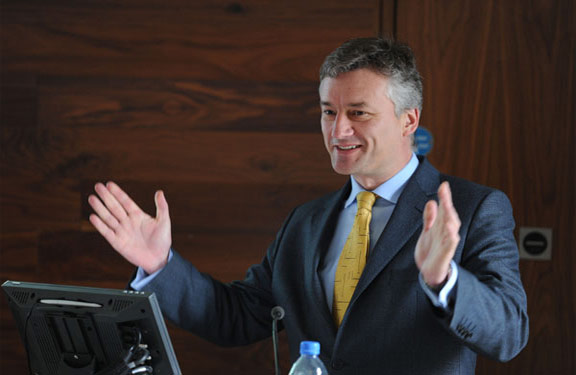The Annual Review of Provost Patrick Prendergast, released this evening, places particular emphasis on his goal to make Trinity a university of “global consequence”, and reveals that the number of non-EU students in Trinity has risen by almost 20 per cent in just two years.
The document serves as a general overview of Trinity’s year, in areas such as global outreach, public engagement, finances, and highlights of sporting achievements and notable visitors, and underlines the goals set out in Trinity’s 2014–19 strategic plan.
The number of non-EU students have increased by almost 20 per cent, rising from 1,642 in 2013 to 1,955 this year. This is in some part thanks to an almost 30 per cent increase in students originating from Asia – from 567 to 729 – where the Provost has placed particular emphasis on outreach. There was also a 600 per cent increase in students originating from South America, from just 19 students in 2013 to 132 this year. In the same period, students originating from within the EU increased by just 4 per cent, from 15,062 to 15,125.
The general increase seems in line with current College goals to increase the number of international students attending as part of the Global Relations Strategy, with Prendergast writing in the report that “The Global Relations Strategy is about nurturing a multicultural, cosmopolitan campus, and enhancing research and the Trinity Education through internationalisation”.
The review also examines some of Trinity’s notable research endeavours in a series of case studies on researchers and their projects, as it has done in previous years. Included also are interviews with nine new professors, among them Prof Andrew Burke, the Dean of the School of Business.
The review provides an overview of the changes in staffing numbers in the College over the past three academic years. In two years, the number of administrative staff employed by College has risen from 819 to today’s figure of 870. Academic staff numbers, however, have dropped from 785 to 758 in the same time period.
The review noted the exceptional increase in the number of research positions in Trinity – 730 researchers were accounted for in 2014/15, an increase of 124 on last year’s figure.
Financial matters were also discussed in the report. €326.1 million is noted as total income for the year ended 2014, an increase on 2013’s figure of €318.4 million. Nevertheless, the report touches on the current less-than-ideal financial situation students have been facing recently: the decrease in the state grant to the College over the three-year period from €58.6 million to €47.3 million is noted, as is the increase of income through student academic fees from €113.8 million to €122.2 million over the same period of time.
Total staff employed by the College rose to 3,011 during the 2014/15 year. This is an increase on the 2,868 recorded in 2013/14, which itself was a drop from the previous year’s figure of 2,937.
Research case studies that were highlighted in the review include an examination of North Atlantic fishing patterns from 1400 to 1700 by Prof Poul Holm, the Founding Director of the Trinity Long Room Hub; research by Prof Luke O’Neill on the MC950 molecule and its role in potentially fighting inflammatory diseases; and investigations into women’s rights and feminism in Iran by Dr Roja Fazaeli.
Vice-Provost Linda Hogan also discusses her own research on human rights and theology in the review. Her new book Keeping Faith with Human Rights examines how human rights issues can be examined in the context of contemporary understandings of religious belonging.







